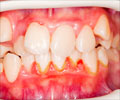Doctors often prescribe bisphosphonates for both osteoporosis as well as certain cancers. The usage has been increasing due to large-scale marketing and advertising to consumers.
Taken orally, these medications (such as Boniva® or Fosamax®) can help promote bone density in women with osteoporosis, and taken intravenously, can help stop the spread of cancer in chemotherapy patients. However, the use of bisphosphonates has also been linked to osteonecrosis of the jaw, more commonly known as “dead jaw.”Osteonecrosis occurs when part of the jawbone essentially dies and becomes exposed. The disease is more prevalent among patients who receive bisphosphonates through an I.V., but Jon Suzuki, D.D.S, Ph.D., M.B.A., professor and director of the graduate program in periodontology at Temple University’s Maurice H. Kornberg School of Dentistry, says physicians and dental professionals should still keep a close eye on their patients who take the oral form.
“This is a very complex issue, and our understanding of it continues to grow,” said Suzuki. “Both dental and medical professionals need to maintain open lines of communication with each other to ensure the best care for their patients who are taking bisphosphonates.”
Previous studies have found between 1 and 10 patients out of 100 who receive bisphosphonates through an IV are at risk of the disease, while only about 1 in 100,000 patients taking the oral form are at risk.
Existing research suggests that taking these medications orally for more than three years or intravenously for more than six months could disturb the balance between bone cells that produce calcium and those that remove calcium. This condition can lead to oral health problems including loose teeth, jaw and gum pain, swelling and infection, numbness and gum loss.
Patients who have existing dental problems or have just had dental work and are taking bisphosphonates are also at higher risk for osteonecrosis. Suzuki advises that these patients have a full dental exam to determine the health of their jaw and what level of bisphosphonates would be appropriate.
Advertisement
Advertisement
SRM











